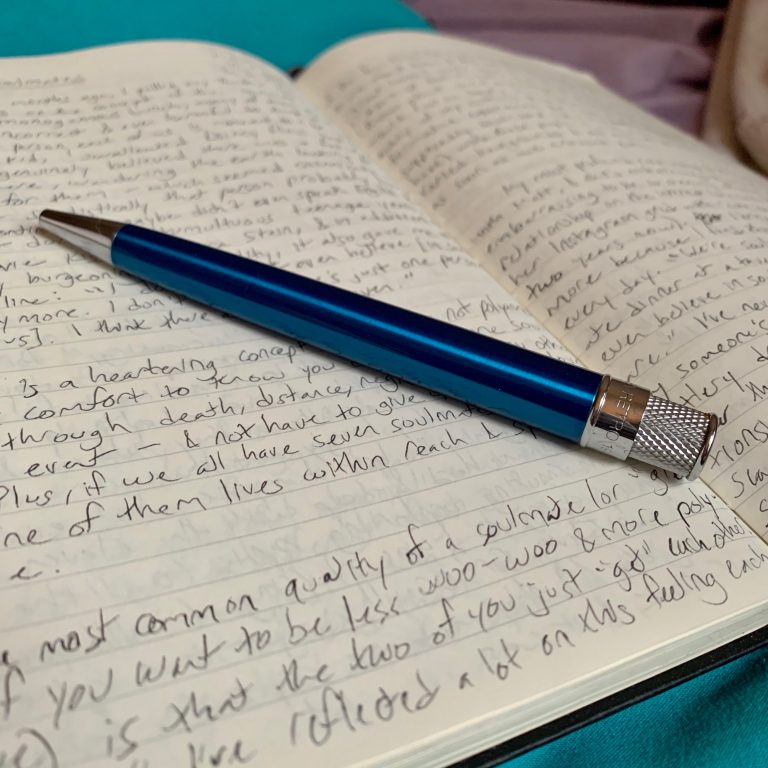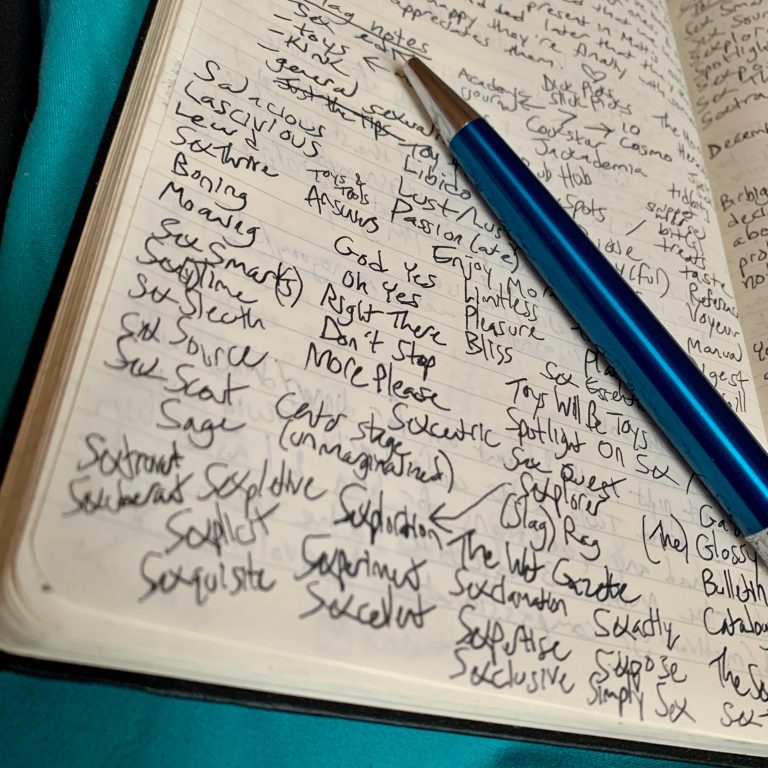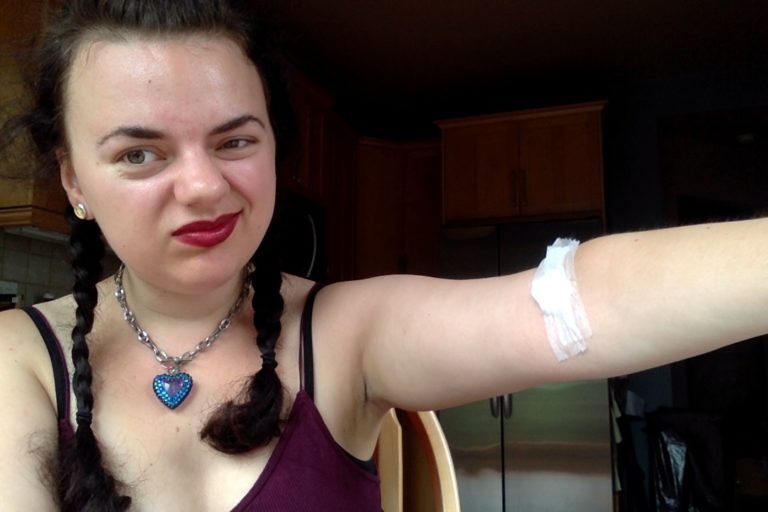
Content note: This post will touch on social anxiety, alcohol, and drugs.
Parties are simultaneously the bane of my existence and some of my most looked-forward-to events. I’m sure some of the introverts reading this can relate! I love the getting-ready part and the chatting-tipsily-with-cool-people part; it’s the part in between that usually makes me nervous – sometimes to the point of not wanting to attend at all! If this sounds familiar, don’t worry: I’ve got some tips to help you get through the next party you attend. Here we go…
Wear at least one “conversation piece.”
Getting ready for a party feels to me like casting a magic spell. It sets the tone for the whole event and lays the groundwork for how I will feel, and how I will be perceived. One thing I always try to do when assembling a party ensemble is to include clothing items and accessories that are eye-catching, a little odd, and easy for someone to comment on or ask about. As you probably know, one of the trickiest things about approaching new people at a party is not knowing what to say – so by wearing something worth remarking upon, you’re doing the other party-goers a favor by giving them a free conversation starter to use with you! Some of my fave eye-poppin’ pieces are flashy heart-shaped jewelry, oversized hair accessories, enamel pins, bright-colored lipstick, and really great shoes.
Tell yourself you only have to stay for an hour.
I do this for almost every party I ever go to, and in almost every case, I end up staying longer than that one hour. It’s just a way of tricking my brain into letting me attend the party, because I know I can get through an hour, even if the whole hour sucks (which it never does). This is also a way I take care of myself: if I genuinely want to leave after an hour, it’s almost certainly because either the party is bad or there is something going on with my physical or mental health that’s making it difficult for me to enjoy myself – and in either case, I’d be happier at home on the couch, wrapped in a blanket and watching Netflix. If you’re attending a party with other people, you might want to tell them about your time-limit plan, too – this is a way of setting expectations so you don’t disappoint your party-animal friends when you’re walking out the door while their night’s just getting started. (Remember: even if you live together, you don’t have to leave the party at the same time!)
Keep your eyes up and your body language open.
I went to a raucous party full of mostly strangers with my partner last week (more on that soon) and noticed that way more people came up and talked to us than would ever approach me if I’d been there by myself. Setting aside the fact that my partner is very handsome and magnetic (which they are), I think this phenomenon mostly occurred because my energy was totally different than it would’ve been if I was alone. I wasn’t hunched over my phone in a corner, or affecting faux-blasé body language to seem cool and aloof – I was looking around the room, bright-eyed and phoneless, curious about who we could talk to next. Of course people wanted to meet us! Consider adapting the way you hold yourself, behave, and look at folks the next time you attend a party – it could totally transform your experience.
Come up with a go-to line to start a conversation.
Asking someone how they know the host is usually a safe bet. Complimenting some aspect of their outfit, as we’ve discussed, is another. If a holiday is coming up or has just passed, you can ask someone how they spent it or plan to spend it. Dating coach Camille Virginia recommends commenting on something in your environment – like, “Wow, this playlist is incredible,” or “[The host] always throws such great parties.” If you’re feeling a little braver, you could also just ask people one of these 100 questions Alex Franzen recommends – they might think you’re a bit of a weirdo at first, but then they’ll probably be excited to answer such an interesting question!
Watch your alcohol/drugs intake.
Look, I’m not going to tell you how to live your life; I’m not your dad. I just know that when I feel anxious at a party, I often lean too hard on substances, both to alleviate my mental discomfort and to give me something to do with my hands so I feel less awkward. If I get too drunk or too high, I almost invariably end up doing something I regret – often something embarrassing enough to give me even more anxiety the next day when I remember what happened! Naturally, this topic is extra fraught for people who struggle with addiction, or have done so in the past: parties can be a very triggering or challenging environment. When I’m trying to lay off the substances at a party, I’ll usually pour a non-alcoholic beverage (or even just water) into my glass and sip on that, or nibble on a snack – both help me feel less out-of-place and awkward, without getting me wasted.
Find one person and make them feel fascinating.
One of the reasons parties stress me out is that I feel a pressure to talk to tons of people – but the truth is, I often have my best party-going experiences when I only have one or two intense, intimate conversations, as opposed to several more casual or perfunctory ones. This jives with what some social psychology thinkers say about how introverts hate small talk and much prefer more soul-baring interactions. If you can find even just one person at the party who has an interesting job, or majored in something cool, or has an amazing outfit on, or is obsessed with the same TV show as you, you can ask a zillion follow-up questions (so long as they seem up for that) and go deep with this one person instead of swimming around in the shallow end with a bunch of people you barely know.
Take breaks when you need to.
Remember what I said earlier about how you should keep your phone tucked away and your eyes up? Yeahhh, there’s only so long I can do that for. Most of my introverted friends have some sort of system for taking periodic breaks at parties, whether they like to head outside for a smoke, step out on the balcony for a quiet moment alone, or hole up in the bathroom to check their email (just be mindful that other guests might need to pee!). At particularly crowded parties, sometimes you can take a time-out just by sitting in the corner by yourself and texting a friend or reading an article on your phone. (I used to have a friend who would legit bring a book to every party and unabashedly pull it out to read when she needed a moment of simulated solitude… Kudos.) You might find your brain feels more juiced up and socially energetic after even a brief breather, so you can get back in there and keep the party going.
Help with party logistics if you can.
Ask the host if you can help make drinks, collect used dishes, take people’s coats, run the evening’s game of Charades, or whatever other practical things need doing. This’ll help you feel less awkwardly aimless, while also giving you a low-pressure opportunity to meet and talk to a lot of the other attendees. Plus you’ll be helping out the host, who is probably rushed off their feet!
See someone standing alone? Go talk to them.
They’re probably one of your own kind! And they’ll almost certainly be grateful you bothered. A simple “Hey! How’s your night going?” can turn someone’s whole evening around. Similarly, if you’re standing in a group and you see one or two people nearby looking left out, invite them into your circle. Parties are supposed to be all about mingling, after all!
Exit conversations gracefully.
I’m not always the best at this. Sometimes you want to leave an interaction, either because you’re getting socially overwhelmed or you just… don’t really like the person you’re talking to. It’s possible to do this without seeming rude, but most people aren’t very good at it! Try one of these lines: “Well, it was nice talking to you. I’m gonna mill around.” “It was so good to meet you – have a good time tonight!” You could also just make up an excuse (“I have to go to the bathroom,” “I have to go help my friend with something,” “I have to make a phone call”) but the truth is better, and often kinder.
Recharge as needed when you get home.
You probably know what kinds of activities help you reset your brain after expending a lot of social energy. I like to get in a hot bath with a book, watch some silly YouTube videos, or just stare mindlessly at my phone for a while. Whatever works best for you, do it – not only because you need it, but also because you’ll start to associate parties with that horrible drained feeling if you let yourself linger in that mood for too long after a party. Doing proper post-event self-care helps keep your relationship to parties a positive one!
What are your best tips for going to parties as a shy, anxious, and/or introverted person?




